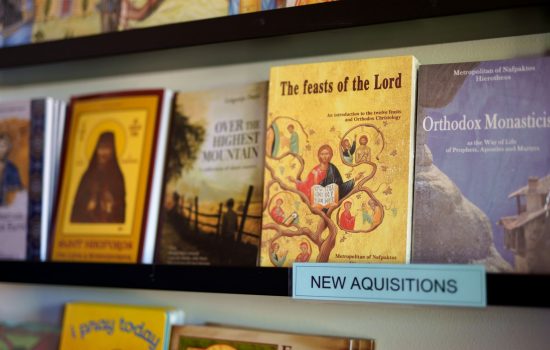I recently took in my old VHS video machine in for repair. No sooner had I entered the repair shop when the man behind the counter started to engage me in deep discussion. I really had no opportunity to speak other than to offer the odd nod of approval and wear a friendly smile. Presbytera often speaks about the verbosity of middle aged men we would call to our home for the odd repair job. There was no way she was going to get away with simply the job being done and payment being made. Any hint of politeness of course which is well ingrained in us instantly communicates friendliness and approval which inevitably leads to the offer of coffee, tea and biscuits and the opportunity to hear more about life’s’ meaning. People it seems, particularly middle aged men have a need to philosophize about life – they are continually searching for meaning beyond the immediate task at hand. People can apply themselves remarkably well to menial tasks but there is no way that the human spirit can remain there. Once knowledge is acquired and the skills associated with the use of that knowledge is mastered, the human spirit wants to move on and to rise above it all. It is as if once the brain has learnt its tasks and functions successfully, we arrive at the point (sometime after the challenge has gone) where we ask ourselves ‘Is this what life is all about?’ It is said that ‘familiarity breeds contempt’, as a strong desire within us drives us to shift our focus of interest away from the reasoning of the brain to another place which has a different orientation – our heart. This can happen to us when we are young or old and people of all walks of life no matter who they are. Hopefully, at some point in our lives, whether it be a conscious shift or not, whether it be as a result of some crisis in our life or by gradual maturation – we will tend to move from a focus of knowledge and reasoning about the world and the things of the world, to a knowledge of the heart within us, so that, God willing, we may be able to hear God’s voice.
Getting back to our video man – after talking about anything and everything relating to the state of the world, he moved quickly on to a more specific subject relating to memory. Being technically minded he began to explain to me how science was progressing to such an extent that our DVD’s would not be able to work in 30 years time as advances in technology would render them obsolete. Hardly remarkable, l thought to myself, given that we have seen so many other things become obsolete over the past 40 years. Then he popped the question which I knew was coming based on my appearance – “Jewish are you?” No I said, but I did not get a chance to say anymore as he quickly moved on to what he wanted to say to me. “You know” he said, “Science is beginning to unlock the secrets of memory.” “Oh” I said, “really?” I knew instantly that he was about to launch into a full blown philosophical discussion which I was not sure I was really ready for, having just come in to drop off my video machine for repair. “Yes” he said, “They are working on identifying the chemical composition and changes in the brain that occur when we access our memory.” “Think about it,” he said, “if they do that, and they say they are getting close, man will be able to live forever.” “What makes you think that?” I asked him. “Well”, he said “if you think about it, memory is life. The body just gets old and withers but the memory remains. The real person is about memory, because everything about you and life as a whole comes down to memory. If the memory goes, even if the body is well, there is no person really there.”
“Look” I said to him, firstly I have to tell you who I really am, “I am not Jewish, I am a Greek Orthodox Priest – and the things that you have just said are things that I cannot remain quite about as a matter of my conscience.” “Are you of any faith?” I asked. “Oh yes” he said in a half baked shaky manner, “I am a Roman Catholic.” He quickly moved subject to talk about how he sent his children – now adults, to a Roman Catholic school, but his response had all the hallmarks of a “lapsed Catholic.”
“Your thoughts about memory sound good but there is a huge hole in your thinking”, I said to him. “Oh” he said, “and what is that?” “Nothing has existence other than God, and whatever has existence, is because of God” I replied. “How is it that God is not included in your thinking? The material that scientists hope to discover may unlock one small facet of God’s mystery about life, but it will never offer a key to immortal life – which is effectively what you are talking about” I replied. “The key to immortality can only be found in Jesus Christ, the Son of God. Put simply, the material that the scientists are investigating is corruptible and degradable, immortality has to do with what is incorruptible – and that has to do with God. How is that we can both sit here having this conversation about the promise of science and give no acknowledgement to God from whom we were created, from whom we draw our every breath of life.”
How disappointing it is to see people still hoping that science will offer them, or humanity as a whole the hope of everlasting life. Unless we suffer the realization and enlightenment to see that nothing can be retained outside of God’s providence, we will continue to believe in vain those empty lifeless things and entertain useless thoughts like these. By so doing we waste our life.
But this is not only true of Science but also of Theology itself. Real knowledge is retained in the heart. Real knowledge is not about facts and figures and reasoning, nor the storage and recalling of these things in our memory. This kind of memory is lifeless.
St Paul warns us “Beware lest anyone cheat you through philosophy and empty deceit, according to the tradition of men, according to the basic principles of the world, and not according to Christ. (Col. 2:8)
“There are two ways for theology” writes Arcminandrite Sophrony (pp. 62, On Prayer SVS Press, 1996) “the one widely familiar in previous centuries, appertaining to the professional theologian; the other, which means being crucified with Christ, knowing Him in the secret places of the heart. The first of these types is accessible to the majority of the intellectually endowed having a preference for philosophical subjects – genuine belief in the Divinity of Christ expressing itself in a life lived according to the spirit of His commandments is not needed. The second is the theology of the confessors, which is born of a profound fear of God in the fiery flames of repentance, leading to existential reality through the appearance of Uncreated Light. Academic theology combined with living faith affords blessed results. But it can easily degenerate into abstract theory, and cease to be what we see in the lives of the Apostles, Prophets, Fathers – the direct action of God in us. ‘No man can come to me, except the Father which hath sent me draw him… It is written in the prophets. And they shall be all taught of God. Every man therefore that hath heard’ [in his heart] ‘and hath learned of the Father, cometh unto me.’”
Fr Emmanuel Stamatiou


















